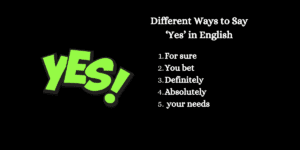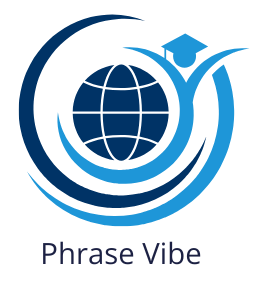When learning English, it’s helpful to know various expressions that native speakers use. Saying “yes” can have different meanings based on context and situations. This is important because sometimes native English speakers say “yes” in ways that might seem confusing to non-native speakers. To understand these expressions, you must learn which types of “yes” expressions work best in different situations.
Imagine you’re a guest at an event and someone asks if you’d like more food. Instead of a simple “yes,” you might say “sure” or “gladly.” These expressions add warmth and make your answers sound more creative and polite. Use them to express your interest or enthusiasm, as they go beyond a simple “yes.” By trying these different ways, you’re not only being polite but also learning to speak like a native and express yourself in a lovely way that others will understand instantly.

List of Different Ways to Say ‘Yes’ in English
- Yeah
- Yup
- Yep
- Mm-hmm
- Uh-huh
- For sure
- You bet
- Definitely
- Absolutely
- Without doubt
- Sure
- No problem
- Happy to
- Of course
- Certainly
- Love to
- Go ahead
- Be my guest
- Why not
- Affirmative
- Indeed
- No worries
- Consider it done
- On it
- Delighted
- All right
- Fine
- Gladly
- By all means
- Ok
- So true
- Indeed
- It is
- Really
- He does
- Uh-huh
- Totally
- Absolutely
- Yep
- Yeah
- My thoughts
- Exactly
- For sure
- Love it
- Someone
- Why not
- That’s right
- Correct
- By all means
- Go ahead
- Be my guest
- Fine
You Might Like To Read Alternative Ways to Say “Please Let Me Know if This Works for You”
Yeah
-
- Category: Informal
- Use: Friendly agreement, often with friends or peers
- Example: “Want to grab lunch?” “Yeah, sounds good!”
Yup
-
- Category: Casual
- Use: Casual response, mostly used among close friends
- Example: “Are you coming to the game?” “Yup!”
Yep
-
- Category: Casual
- Use: Informal confirmation, good with friends or peers
- Example: “Did you finish the movie?” “Yep, loved it!”
Mm-hmm
-
- Category: Informal, Casual
- Use: Quick acknowledgment, often used in conversations when multitasking
- Example: “Is the report ready?” “Mm-hmm, it’s done.”
You Might Like To Read Creative Ways to Say “Your Cooperation is Much Appreciated
Uh-huh
-
- Category: Casual
- Use: Often a short reply during a phone or in-person conversation
- Example: “You got the message?” “Uh-huh, got it!”
For sure
-
- Category: Casual
- Use: Positive confirmation, often with a bit of enthusiasm
- Example: “You coming to the party?” “For sure!”
You bet
-
- Category: Informal
- Use: Shows agreement with a sense of readiness
- Example: “Can you help me tomorrow?” “You bet!”
Definitely
-
- Category: Neutral, slightly formal
- Use: Confident confirmation, suitable for work or formal settings
- Example: “Will you be joining us?” “Definitely, I’ll be there.”
Absolutely
-
- Category: Formal
- Use: Strong agreement, used in both formal and informal contexts
- Example: “Is this your final decision?” “Absolutely.”
Without doubt
-
- Category: Formal
- Use: Emphasizes strong certainty in a formal way
- Example: “Is this the best solution?” “Without a doubt.”
Sure
-
- Category: Casual
- Use: Light agreement, works well in everyday settings
- Example: “Can you send that email?” “Sure!”
No problem
-
- Category: Casual, Informal
- Use: Agreeing to a small favor, often used with friends or peers
- Example: “Could you watch my bag?” “No problem.”
Happy to
-
- Category: Formal, Neutral
- Use: Expresses willingness, common in professional settings
- Example: “Can you lead the meeting?” “Happy to.”
You Might Like To Read Unique Ways to Say “Happy Friday”
Of course
-
- Category: Neutral
- Use: Polite and reassuring confirmation, often in customer service
- Example: “Can I get more information?” “Of course.”
Certainly
-
- Category: Formal
- Use: Polite affirmation, ideal in formal contexts
- Example: “Is this available now?” “Certainly.”
Love to
-
- Category: Casual, Friendly
- Use: Warm way to express agreement with enthusiasm
- Example: “Want to join us for dinner?” “Love to!”
Go ahead
-
- Category: Casual
- Use: Permission or encouragement for someone to proceed
- Example: “Can I borrow your book?” “Go ahead.”
Be my guest
-
- Category: Casual, Polite
- Use: Polite way to grant permission
- Example: “Mind if I use your pen?” “Be my guest.”
Why not
-
- Category: Casual
- Use: Light agreement, often to say yes to spontaneous ideas
- Example: “Want to go for a drive?” “Why not?”
Affirmative
-
- Category: Formal, Technical
- Use: Often used in professional or technical communications
- Example: “Is this operational?” “Affirmative.”
Indeed
-
- Category: Formal
- Use: Agreement with added emphasis, often formal or literary
- Example: “Is this our final choice?” “Indeed.”
No worries
-
- Category: Informal
- Use: Casual reassurance, often used with friends
- Example: “Sorry for the delay!” “No worries.”
Consider it done
-
- Category: Formal, Confident
- Use: Assures someone the task will be handled
- Example: “Can you manage this report?” “Consider it done.”
On it
-
- Category: Casual, Informal
- Use: Short reply indicating action will be taken
- Example: “Send the files over.” “On it!”
You Might Like To Read Alternative Ways to Say “Can You Repeat That?”
Delighted
-
- Category: Formal
- Use: Formal, positive response often in invitations
- Example: “Will you join us?” “Delighted.”
All right
-
- Category: Casual
- Use: Agreement, sometimes to confirm understanding
- Example: “Can I get that file?” “All right.”
Fine
-
- Category: Casual
- Use: Casual acceptance, often neutral
- Example: “Is the schedule okay?” “Fine.”
You Might Like To Read Different Phrases for “New Car Wishes”
Gladly
-
- Category: Formal, Polite
- Use: Polite acceptance, common in service settings
- Example: “Could you assist me?” “Gladly.”
By all means
-
- Category: Formal
- Use: Enthusiastic agreement, polite or formal settings
- Example: “Can I take a copy?” “By all means.”
Ok
-
- Category: Casual, Universal
- Use: Simple and universal, used in almost any setting
- Example: “Are you ready?” “Ok.”
So true
- Category: Casual
- Use: Friendly affirmation, agreeing with a statement
- Example: “Mondays are tough.” “So true!”
Indeed
- Category: Formal
- Use: Strong affirmation, often in polite or serious discussions
- Example: “This is a challenging project.” “Indeed, it is.”
It is
- Category: Neutral
- Use: Simple agreement, suitable in any setting
- Example: “Is this the right way?” “It is.”
Really
- Category: Casual
- Use: Casual confirmation, often used in conversations
- Example: “You enjoyed the show?” “Really!”
He does
- Category: Informal
- Use: Agreement, especially when talking about someone else’s action
- Example: “He works hard.” “He does!”
Uh-huh
- Category: Casual
- Use: Quick, non-verbal affirmation, usually in spoken conversation
- Example: “Are you listening?” “Uh-huh.”
Totally
- Category: Informal
- Use: Emphatic agreement, often to show enthusiasm
- Example: “That movie was amazing!” “Totally!”
Absolutely
- Category: Formal
- Use: Strong confirmation, suitable in both formal and informal settings
- Example: “Is this your decision?” “Absolutely.”
You Might Like To Read Unique Ways to Say “Please Disregard My Previous Email”
Yep
- Category: Casual
- Use: Informal “yes,” friendly and casual
- Example: “Did you bring the snacks?” “Yep!”
Yeah
- Category: Casual
- Use: Common, relaxed agreement, works well with friends
- Example: “Want to go out later?” “Yeah!”
My thoughts
- Category: Neutral
- Use: Agreement, used when you share the same opinion
- Example: “We should start now.” “My thoughts exactly.”
Exactly
- Category: Casual, Neutral
- Use: Strong agreement, often used to confirm an opinion
- Example: “That’s what I was thinking!” “Exactly!”
For sure
- Category: Casual
- Use: Friendly confirmation, often with a positive tone
- Example: “Are you joining us?” “For sure!”
Love it
- Category: Casual
- Use: Shows enthusiasm or agreement, especially for something enjoyable
- Example: “Look at this artwork!” “Love it!”
Someone
- Category: Informal
- Use: Refers to general agreement when talking about a person
- Example: “Someone always gets it right.”
Why not
- Category: Casual
- Use: Agreement with a bit of spontaneity, often for suggestions
- Example: “Want to try a new restaurant?” “Why not!”
That’s right
- Category: Neutral
- Use: Simple confirmation, often to verify information
- Example: “Is your name Alex?” “That’s right.”
Correct
- Category: Formal
- Use: Polite, formal way of agreeing, often in response to questions
- Example: “Is this address correct?” “Correct.”
By all means
- Category: Formal
- Use: Enthusiastic permission, often in formal contexts
- Example: “Can I take notes?” “By all means.”
Go ahead
- Category: Casual, Neutral
- Use: Casual way to give permission
- Example: “Can I use your phone?” “Go ahead.”
Be my guest
- Category: Casual, Polite
- Use: Polite way to grant permission
- Example: “May I sit here?” “Be my guest.”
Totally
-
- Category: Informal
- Use: Emphatic agreement, often with friends or peers
- Example: “This party is amazing!” “Totally!”
You Might Like To Read Alternative Ways to Respond To A Happy Thanksgiving Message?
For sure
-
- Category: Casual
- Use: Positive confirmation, friendly and enthusiastic
- Example: “Are you coming to the concert?” “For sure!”
Love it
-
- Category: Casual
- Use: Shows excitement or approval, often for something enjoyable or appealing
- Example: “Check out this new song!” “Love it!”
Why not
-
- Category: Casual
- Use: Spontaneous agreement, often when trying new things or agreeing to plans
- Example: “Want to try that new restaurant?” “Why not!”
Sure
-
- Category: Casual, Neutral
- Use: Simple agreement, suitable for any informal situation
- Example: “Can I borrow your pen?” “Sure!”
Antonyms & Near Antonyms of Yes
- No
- Nay
- Scarcely
- No way
- Not really
- Absolutely not
- Negative
- Never
- Not at all
- Unlikely
- No chance
- Hardly
- Out of question
- Not possible
- Decline
